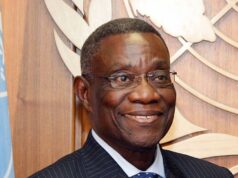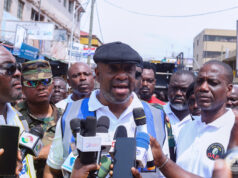Data compiled by the Health Insurance Service Providers Association of Ghana (HISPAG) has revealed that 500 people have died nationwide since public sector doctors declared a strike on July 30, 2015, to demand conditions of service.
It is believed that many of the dead could have been saved as they died while being transported from one hospital to the other.
The number of deaths is believed to be higher than the 500 because many deaths, especially in rural communities, are said not to be reported.
For example, reported deaths from the Brong Ahafo Region alone amount to 47 as of the time of filing this report yesterday.
The Korle Bu Teaching Hospital and 37 Military Hospital in Accra have also recorded 10 and 19 deaths respectively.
The situation has been aggravated by the shortage of essential drugs at HISPAG facilities due to a $12.5 million debt owed them by the National Health Insurance Authority (NHIS).
The money covers services provided to National Health Insurance Service (NHIS) subscribers by HISPAG members for the past six months, but the members have not been reimbursed.
Mr Frank Richard Thorblu, Executive Secretary of HISPAG, told The Finder that the group held an emergency meeting on Saturday and the unanimous decision was to appeal to government to immediately pay them the $12.5 million debt, as well as order essential drugs to be flown into the country while also buying from local manufacturers to save lives.
He said HISPAG is saddened by the death of Ghanaians and is doing everything possible to save lives, but government’s failure to reimburse them for services provided is making this difficult for them.
He warned that should private hospitals deny NHIS subscribers due to the indebtedness; it could result in civil strife in the country.
Mr Thorblu, who described the situation as a national crisis, disclosed that HISPAG would hold a press conference during the week, during which it plans to appeal to government to bring in some Cuban doctors to run Korle Bu, Komfo Anokye and all other government hospitals in the interim to save lives while government sorts out issues with doctors.
The Emergency, Trauma and Surgical Ward of the 37 Military Hospital is in a “crisis situation” as patients are made to sit on plastic and metal chairs to receive medical care while others are made to lie on the floor.
The situation, according to the matron in charge of the Emergency, Trauma and Surgical Department, Lieutenant Col. Owusu Akorful, is because of the increased numbers.
She said management has been compelled to cut down the time and number of days it had to attend to patients because of limited medical supplies and space. Doctors have refused to see out-patients or admit new inpatients despite pressure from government, religious and cultural leaders to go back to work.
They want better conditions of service, a problem for a government that is trying to cut a large budget deficit in order to stick to the terms of a $918 million aid programme from the International Monetary Fund (IMF).
The strike is increasing pressure on President John Dramani Mahama’s government ahead of next year’s elections, which are expected to be tightly contested.
The economy is dogged by slowing growth, growing debt and a stubbornly high budget deficit partly attributed to a big public wage bill in the 2012 elections.
Public sector wages swallow up 50-55% of tax revenues, down from 70% three years ago, but still a concern for the IMF. The MF wants government to reduce it further to 35% of tax revenues.
Source: The Finder






























